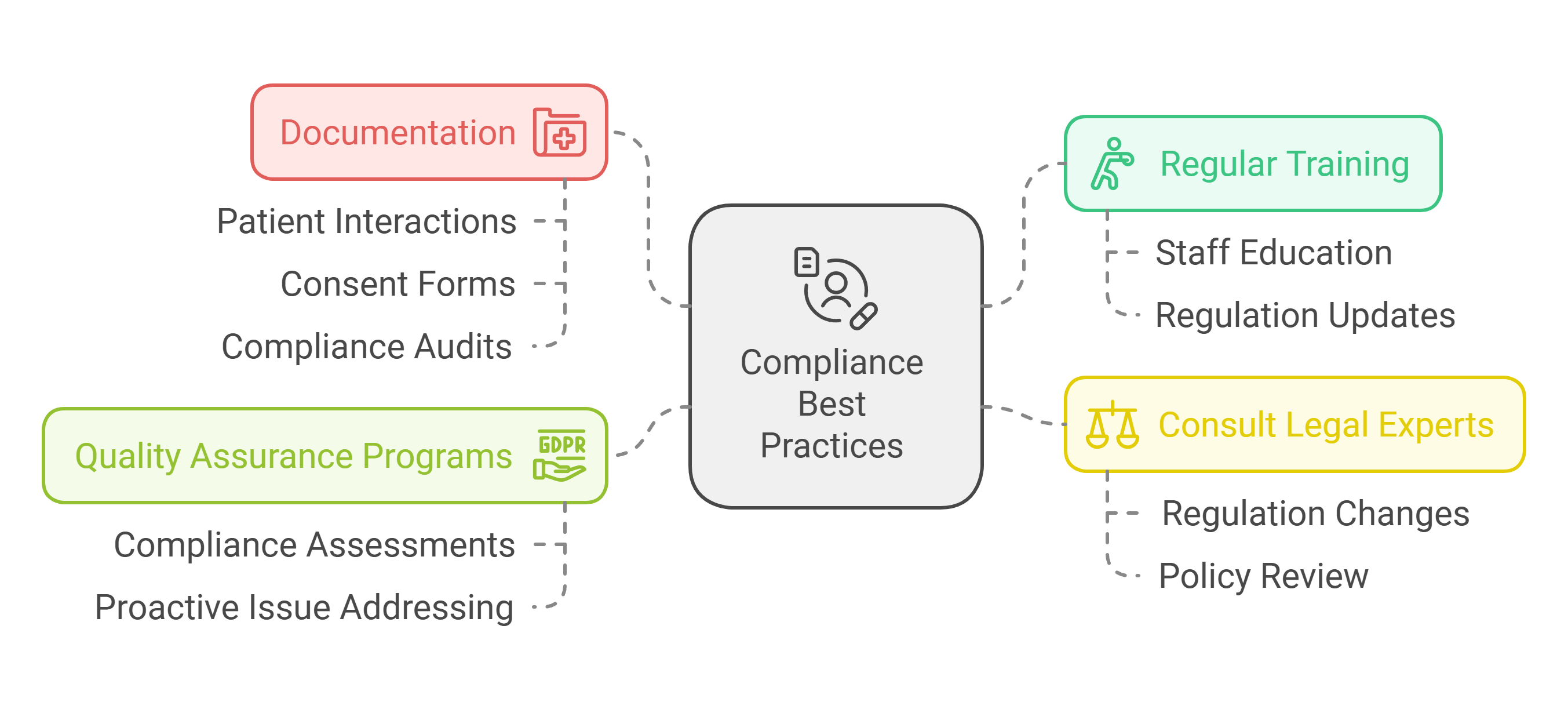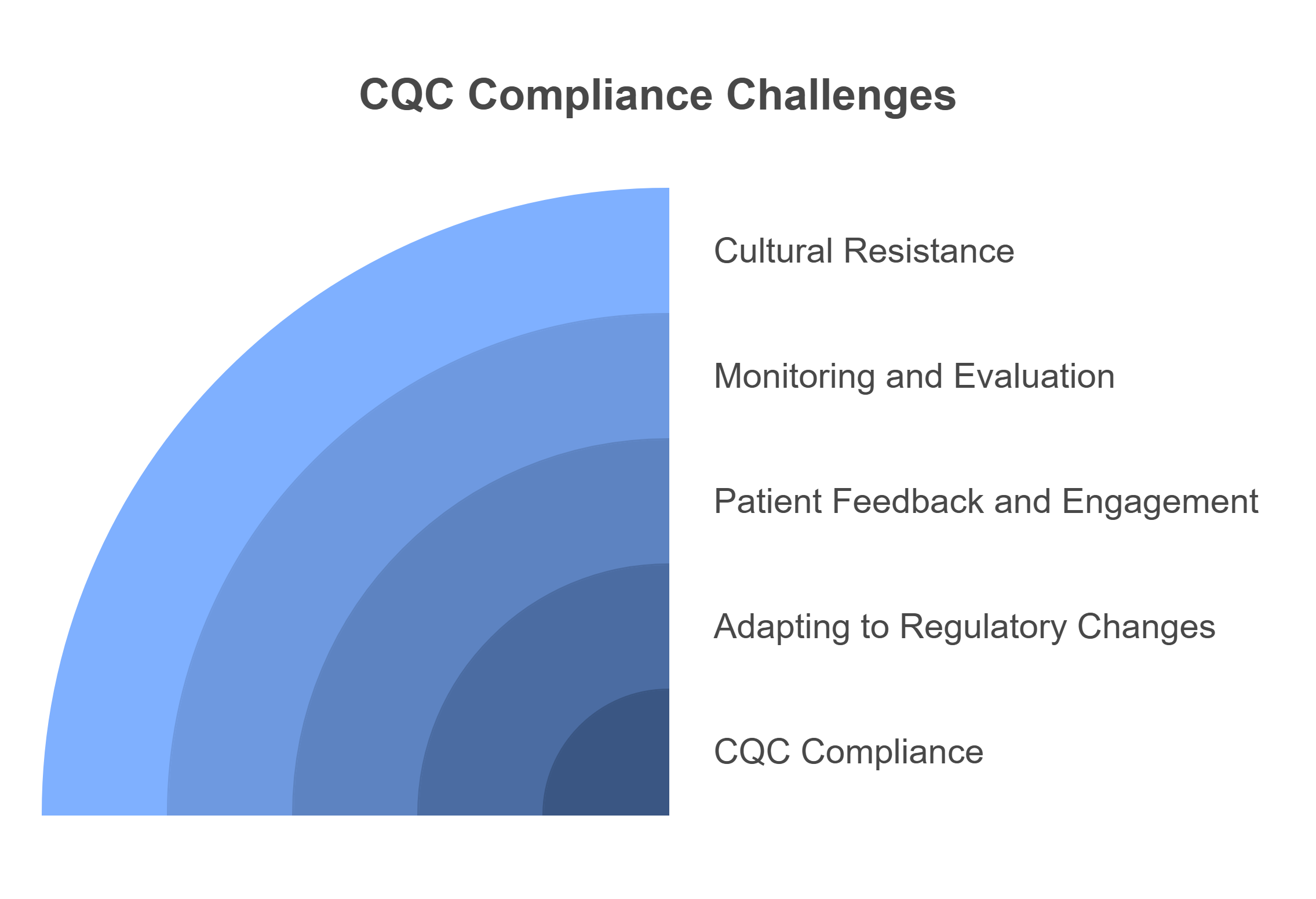CQC Registered Clinics for Excellence

Table of Contents
ToggleIs your aesthetic clinic ready to meet CQC requirements?
Achieving Care Quality Commission (CQC) registration is more than just a box to tick—it’s about ensuring patient safety, building trust, and positioning your clinic as a leader in quality care. Let’s explore what it takes to get there.
Key Takeaways
- CQC registration is essential for clinics offering surgical or medical treatments.
- Non-invasive aesthetic services typically do not require CQC registration.
- Being CQC registered can enhance patient trust and improve clinic reputation.
- Compliance with CQC standards ensures better patient safety and care quality.
- Consulting with experts can help clinics navigate the CQC registration process.
Understanding CQC Registration for Aesthetic Clinics

Definition and Purpose of CQC
The Care Quality Commission (CQC) is an independent regulator in England. Its main role is to ensure that health and social care services meet essential standards of quality and safety. CQC registration is crucial for clinics that provide certain regulated activities, as it signifies compliance with these standards.
Types of Services Requiring Registration
Not all aesthetic clinics need to be CQC registered. Here are the types of services that typically require registration:
- Surgical Procedures: Clinics offering invasive cosmetic surgeries like liposuction or facelifts.
- Medical Treatments Using Prescription-Only Medicines: This includes treatments like Botox administered by qualified professionals.
- Treatment of Disease, Disorder, or Injury: Clinics providing treatments for conditions such as excessive sweating.
- Diagnostic and Screening Procedures: Clinics performing health assessments related to cosmetic treatments.
Legal Implications of Non-Compliance
Failing to register with the CQC when required can lead to serious legal consequences. Clinics may face penalties, including fines or closure. It’s essential to understand your clinic’s obligations to avoid these risks.

Being CQC registered not only protects your clinic legally but also enhances your reputation in the competitive aesthetic market.
In summary, understanding CQC registration is vital for aesthetic clinics. It ensures compliance, enhances patient trust, and ultimately contributes to better service quality. If you’re unsure about your clinic’s registration needs, consider consulting with regulatory experts for tailored advice.
Remember, compliance is not just about meeting regulations; it’s about providing the best care for your patients.
Benefits of CQC Registration for Aesthetic Clinics

CQC registration offers several advantages that can significantly enhance your aesthetic clinic’s operations and reputation. By becoming CQC registered, you demonstrate a commitment to high standards of care. Here are some key benefits:
Enhancing Patient Trust and Confidence
- Credibility Boost: Being CQC registered signals to patients that your clinic meets rigorous standards.
- Increased Trust: Patients are more likely to choose a clinic that is compliant with CQC regulations.
- Positive Reputation: A registered clinic often enjoys a better public image, attracting more clients.
Improving Service Quality and Safety
- Regulatory Compliance: Registration ensures that your clinic adheres to legal requirements, reducing the risk of legal issues.
- Patient Safety: Following CQC standards helps create a safer environment, minimising errors and enhancing care quality.
- Access to Resources: CQC registration provides valuable resources and guidance to improve clinic practises.
Gaining Competitive Advantage
- Market Differentiation: In a competitive landscape, being CQC registered sets your clinic apart from others.
- Attracting Patients: Many patients prefer to receive care from CQC-registered providers, which can increase your client base.
- Long-term Growth: Registration can support your clinic’s future development and expansion plans.
CQC registration is not just about compliance; it’s about elevating your clinic’s standards and ensuring the best possible care for your patients.
In summary, CQC registration is a strategic move that can enhance your clinic’s credibility, improve patient safety, and provide a competitive edge in the aesthetic market. Consider the benefits carefully as you plan your clinic’s future.
Steps to Achieve CQC Registration
Achieving CQC registration is a vital step for aesthetic clinics that offer regulated services. Here’s how you can navigate this process effectively:
Preparing Your Clinic for Inspection
- Understand the CQC Standards: Familiarise yourself with the CQC’s essential standards of quality and safety. This knowledge will guide your preparations.
- Conduct a Self-Assessment: Evaluate your clinic’s current practises against CQC requirements. Identify areas that need improvement.
- Implement Changes: Make necessary adjustments to meet the standards. This may include updating policies, enhancing patient care protocols, and ensuring staff training.
Documentation and Record-Keeping Requirements
- Maintain accurate records of patient care, staff training, and clinic operations. This documentation is crucial for demonstrating compliance during inspections.
- Ensure that all records are easily accessible and organised. This will facilitate a smoother inspection process.
- Regularly review and update your documentation to reflect any changes in practise or regulations.
Training and Development for Staff
- Invest in Staff Training: Ensure that your team is well-trained in emergency procedures, hygiene protocols, and patient data management under GDPR guidelines.
- Encourage ongoing education through aesthetic courses focusing on consent, complaints management, and equality.
- Schedule regular training sessions to keep staff updated on new regulations and best practises.
Remember, CQC registration is not just about compliance; it’s about enhancing the quality of care you provide.
By following these steps, you can prepare your clinic for successful CQC registration and ensure that you meet the necessary standards to operate safely and effectively. This commitment to quality care will not only benefit your patients but also enhance your clinic’s reputation in the industry.
In summary, achieving CQC registration involves thorough preparation, meticulous documentation, and continuous staff development. By prioritising these areas, you can position your clinic for success and compliance with CQC standards.
Consider consulting with regulatory experts to assist you in this process.
Common Challenges in CQC Compliance

Navigating Regulatory Changes
Staying updated with regulatory changes can be daunting. The CQC frequently updates its standards, and keeping your clinic compliant requires constant vigilance. Here are some strategies to help you navigate these changes:
- Regularly review CQC updates and guidelines.
- Attend training sessions or workshops focused on compliance.
- Designate a compliance officer to oversee regulatory adherence.
Addressing Staff Resistance
Staff resistance can hinder compliance efforts. Some team members may be hesitant to adapt to new protocols or changes in procedures. To address this:
- Foster open communication about the importance of compliance.
- Involve staff in the development of new policies to gain their buy-in.
- Provide ongoing training and support to ease transitions.
Managing Costs and Resources
Compliance can be costly, especially for smaller clinics. Balancing financial resources while ensuring compliance is crucial. Consider these tips:
- Create a budget specifically for compliance-related expenses.
- Explore funding opportunities or grants for healthcare improvements.
- Implement cost-effective training solutions, such as online courses.
Compliance with CQC standards is not just a legal obligation; it’s a commitment to providing safe and effective care for your patients.
By understanding these challenges and proactively addressing them, you can enhance your clinic’s compliance and ultimately improve patient care.
Case Studies of Successful CQC Compliance
Lessons from Leading Aesthetic Clinics
Many aesthetic clinics have successfully navigated the CQC registration process, showcasing the importance of compliance. These clinics have demonstrated that adhering to CQC standards not only ensures patient safety but also enhances overall service quality. Here are some key lessons learned:
- Prioritise Patient Safety: Implementing strict safety protocols can significantly reduce risks.
- Continuous Training: Regular staff training ensures that everyone is up-to-date with the latest practises.
- Patient Feedback: Actively seeking and addressing patient feedback can improve service delivery.
Innovative Approaches to Compliance
Some clinics have adopted innovative strategies to meet CQC requirements. For instance, using technology to streamline processes has proven effective. Here are a few approaches:
- Digital Record-Keeping: Utilising software for accurate and efficient documentation.
- Automated Consent Forms: Automatically sending consent forms to patients post-booking.
- Regular Audits: Conducting internal audits to ensure compliance with CQC standards.
Overcoming Initial Hurdles
Many clinics faced challenges when first pursuing CQC registration. However, they found ways to overcome these hurdles. Here are some common challenges and solutions:
- Navigating Regulations: Seeking guidance from compliance experts can clarify complex regulations.
- Staff Resistance: Engaging staff in the process fosters a culture of compliance.
- Financial Constraints: Budgeting for compliance-related expenses can alleviate financial stress.
By learning from these case studies, you can better prepare your clinic for CQC registration and ensure a commitment to high-quality care. Remember, compliance is not just a legal obligation; it’s a pathway to building trust with your patients and enhancing your clinic’s reputation.
Future Trends in CQC Regulations for Aesthetic Clinics
As the landscape of aesthetic clinics evolves, so too do the regulations governing them. Understanding these changes is crucial for your clinic’s success.
Emerging Standards and Guidelines
The CQC is continuously updating its standards to reflect the latest in medical practises and patient safety. Here are some key trends to watch:
- Increased focus on patient safety: Expect more stringent requirements for infection control and treatment protocols.
- Integration of technology: New guidelines may incorporate telemedicine and digital health records.
- Patient feedback mechanisms: Clinics will need to implement systems for gathering and responding to patient feedback.
Impact of Technology on Compliance
Technology is reshaping how aesthetic clinics operate. Here’s how:
- Digital record-keeping: Streamlined documentation processes can enhance compliance and reduce errors.
- Telehealth services: Offering virtual consultations can improve access and patient satisfaction.
- Data analytics: Using data to track patient outcomes can help clinics meet CQC standards more effectively.
Predictions for Regulatory Evolution
Looking ahead, the CQC may introduce new regulations that could impact your clinic:
- Stricter regulations for non-invasive procedures: As the market grows, expect more oversight on non-surgical treatments.
- Greater emphasis on staff training: Continuous professional development will likely become a requirement.
- Enhanced patient rights: Regulations may evolve to ensure patients have more control over their treatment options.
Staying ahead of these trends is essential for maintaining compliance and ensuring the safety and satisfaction of your patients. Understanding these changes will help your clinic thrive in a competitive market.
In conclusion, being proactive about CQC registration and compliance will not only safeguard your clinic but also enhance your reputation in the booming unregulated UK aesthetics market. With 20% of people in England considering some form of treatment, yet only 8% of CQC registered clinics offering aesthetics, there is a significant opportunity for growth and trust-building in your practise.
Conclusion
In summary, while not all aesthetic clinics are required to be registered with the CQC, it is wise for those offering medical or semi-medical treatments to consider it seriously. Registration not only enhances patient safety but also boosts the clinic’s reputation in a competitive market. By adhering to CQC standards, clinics can show their dedication to providing high-quality care. If you are unsure about the registration process or its necessity for your clinic, seeking advice from experts can be beneficial. Ultimately, prioritising compliance and safety will lead to better outcomes for both patients and practitioners.
Frequently Asked Questions
What is CQC registration and why is it important for aesthetic clinics?
CQC registration means that a clinic is checked and approved by the Care Quality Commission. It shows that the clinic meets high standards of care and safety, which is important for patient trust.
Do all aesthetic clinics need to be CQC registered?
Not all aesthetic clinics need CQC registration. Clinics that only offer non-invasive treatments, like facials or skin care, usually do not need to register. However, if they provide certain medical treatments, they might need to be registered.
What are the benefits of being CQC registered?
Being CQC registered can help clinics gain patient trust, improve safety and quality of care, and stand out from competitors. It shows that the clinic is serious about providing safe and effective treatments.
What steps do clinics need to take to get CQC registered?
Clinics must prepare for an inspection by ensuring they meet CQC standards. This includes keeping good records, having the right staff training, and making sure their services are safe and effective.
What challenges might clinics face in becoming CQC compliant?
Clinics may struggle with keeping up with changing regulations, staff who are resistant to new rules, and the costs associated with meeting CQC standards.
How can clinics stay updated on CQC regulations?
Clinics can stay informed by regularly checking the CQC website, joining professional groups, and consulting with experts who understand the latest regulations.






